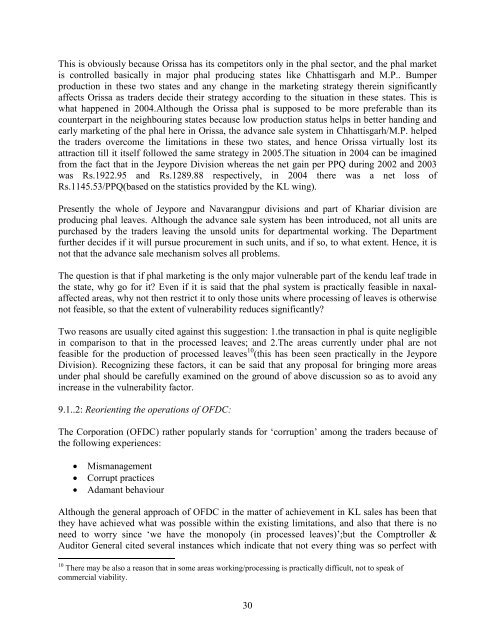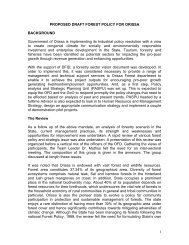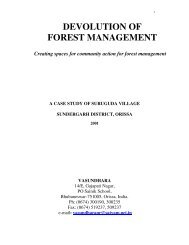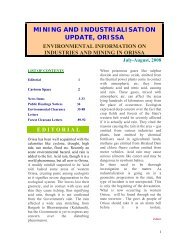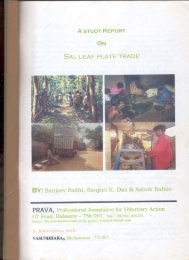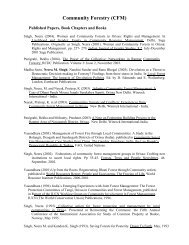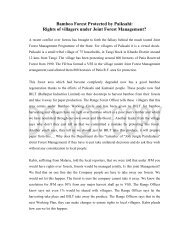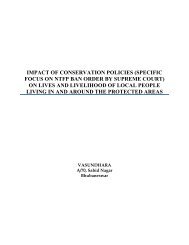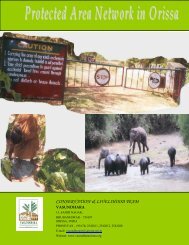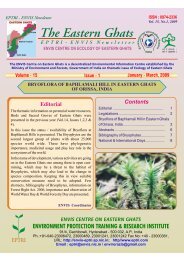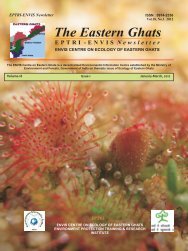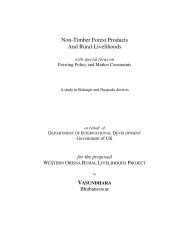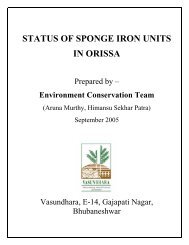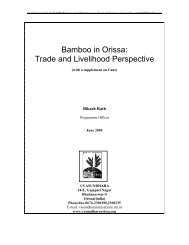The Kendu Leaf Trade: Problems & Prospects in Orissa - Vasundhara
The Kendu Leaf Trade: Problems & Prospects in Orissa - Vasundhara
The Kendu Leaf Trade: Problems & Prospects in Orissa - Vasundhara
You also want an ePaper? Increase the reach of your titles
YUMPU automatically turns print PDFs into web optimized ePapers that Google loves.
This is obviously because <strong>Orissa</strong> has its competitors only <strong>in</strong> the phal sector, and the phal market<br />
is controlled basically <strong>in</strong> major phal produc<strong>in</strong>g states like Chhattisgarh and M.P.. Bumper<br />
production <strong>in</strong> these two states and any change <strong>in</strong> the market<strong>in</strong>g strategy there<strong>in</strong> significantly<br />
affects <strong>Orissa</strong> as traders decide their strategy accord<strong>in</strong>g to the situation <strong>in</strong> these states. This is<br />
what happened <strong>in</strong> 2004.Although the <strong>Orissa</strong> phal is supposed to be more preferable than its<br />
counterpart <strong>in</strong> the neighbour<strong>in</strong>g states because low production status helps <strong>in</strong> better hand<strong>in</strong>g and<br />
early market<strong>in</strong>g of the phal here <strong>in</strong> <strong>Orissa</strong>, the advance sale system <strong>in</strong> Chhattisgarh/M.P. helped<br />
the traders overcome the limitations <strong>in</strong> these two states, and hence <strong>Orissa</strong> virtually lost its<br />
attraction till it itself followed the same strategy <strong>in</strong> 2005.<strong>The</strong> situation <strong>in</strong> 2004 can be imag<strong>in</strong>ed<br />
from the fact that <strong>in</strong> the Jeypore Division whereas the net ga<strong>in</strong> per PPQ dur<strong>in</strong>g 2002 and 2003<br />
was Rs.1922.95 and Rs.1289.88 respectively, <strong>in</strong> 2004 there was a net loss of<br />
Rs.1145.53/PPQ(based on the statistics provided by the KL w<strong>in</strong>g).<br />
Presently the whole of Jeypore and Navarangpur divisions and part of Khariar division are<br />
produc<strong>in</strong>g phal leaves. Although the advance sale system has been <strong>in</strong>troduced, not all units are<br />
purchased by the traders leav<strong>in</strong>g the unsold units for departmental work<strong>in</strong>g. <strong>The</strong> Department<br />
further decides if it will pursue procurement <strong>in</strong> such units, and if so, to what extent. Hence, it is<br />
not that the advance sale mechanism solves all problems.<br />
<strong>The</strong> question is that if phal market<strong>in</strong>g is the only major vulnerable part of the kendu leaf trade <strong>in</strong><br />
the state, why go for it Even if it is said that the phal system is practically feasible <strong>in</strong> naxalaffected<br />
areas, why not then restrict it to only those units where process<strong>in</strong>g of leaves is otherwise<br />
not feasible, so that the extent of vulnerability reduces significantly<br />
Two reasons are usually cited aga<strong>in</strong>st this suggestion: 1.the transaction <strong>in</strong> phal is quite negligible<br />
<strong>in</strong> comparison to that <strong>in</strong> the processed leaves; and 2.<strong>The</strong> areas currently under phal are not<br />
feasible for the production of processed leaves 10 (this has been seen practically <strong>in</strong> the Jeypore<br />
Division). Recogniz<strong>in</strong>g these factors, it can be said that any proposal for br<strong>in</strong>g<strong>in</strong>g more areas<br />
under phal should be carefully exam<strong>in</strong>ed on the ground of above discussion so as to avoid any<br />
<strong>in</strong>crease <strong>in</strong> the vulnerability factor.<br />
9.1..2: Reorient<strong>in</strong>g the operations of OFDC:<br />
<strong>The</strong> Corporation (OFDC) rather popularly stands for ‘corruption’ among the traders because of<br />
the follow<strong>in</strong>g experiences:<br />
• Mismanagement<br />
• Corrupt practices<br />
• Adamant behaviour<br />
Although the general approach of OFDC <strong>in</strong> the matter of achievement <strong>in</strong> KL sales has been that<br />
they have achieved what was possible with<strong>in</strong> the exist<strong>in</strong>g limitations, and also that there is no<br />
need to worry s<strong>in</strong>ce ‘we have the monopoly (<strong>in</strong> processed leaves)’;but the Comptroller &<br />
Auditor General cited several <strong>in</strong>stances which <strong>in</strong>dicate that not every th<strong>in</strong>g was so perfect with<br />
10 <strong>The</strong>re may be also a reason that <strong>in</strong> some areas work<strong>in</strong>g/process<strong>in</strong>g is practically difficult, not to speak of<br />
commercial viability.<br />
30


